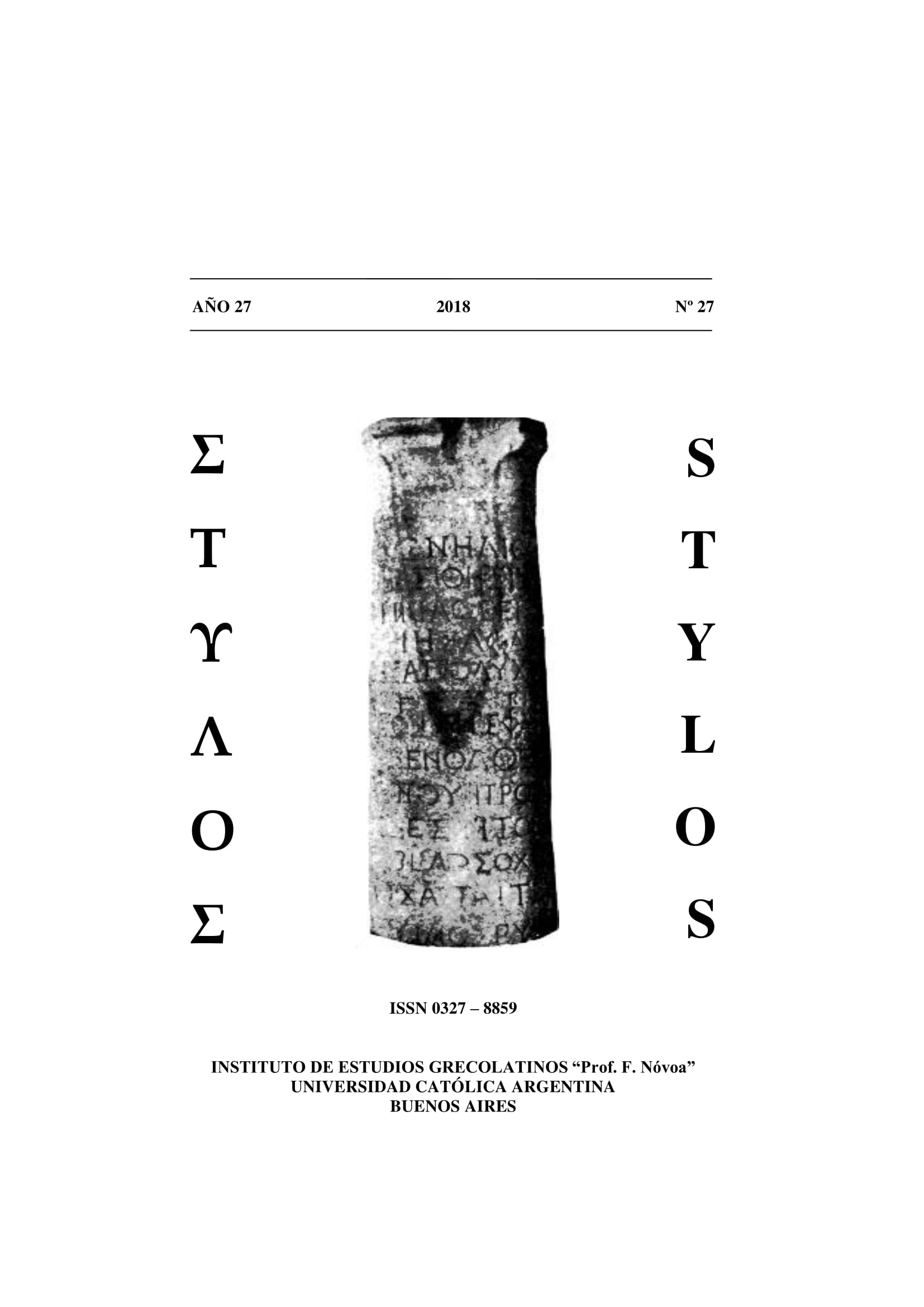EL DESTINO DE LAS ALMAS VIRTUOSAS SEGÁšN FILÓN: ¿QUÉ SIGNIFICA LA INMORTALIDAD?
Palabras clave:
Filón de Alejandría, alma, muerte, inmortalidadResumen
Filón de Alejandría afirma que el alma humana puede alcanzar, tras la muerte corpórea, una vida inmortal. Este es el destino que obtienen las almas virtuosas, las de aquellos hombres que han dedicado su vida terrena a la búsqueda de la virtud y del conocimiento de Dios. Sin embargo, no es sencillo determinar qué significa la inmortalidad para el alejandrino: ¿adónde se dirigen esas almas?, ¿cuál es la forma de su pervivencia?, ¿conservan su individualidad? A fin de indagar las respuestas a estos interrogantes, analizaremos los pasajes donde Filón interpreta la muerte de ciertos personajes que son ejemplo paradigmático de virtud y sabiduría, tales como Abel (Det. 48-49, 70), Abraham (QG 3.11) y Moisés (Virt. 76-78; Mos. 2.288-291). Intentaremos luego dilucidar, mediante el examen de otros pasajes sobre la inmortalidad en los textos filonianos, si todos los seres humanos que practican la virtud y la piedad podrían obtener un destino similar.Referencias
EDICIONES Y TRADUCCIONES
COHN, LEOPOLD, WENDLAND, PAUL Y REITER, SIEGFRIED (eds.) (1962). Philonis Alexandrini Opera quae supersunt. Vols. I-VII. Berlin: De Gruyter (11896-1915).
MARTÍN, J. P. (ed.) (2009-2016). Filón de Alejandría. Obras Completas. Vols. I-V. Madrid: Trotta.
MARCUS, R. (trad.) (1993). Questions and answers on Genesis. Philo. Supplement I. Cambridge-London: Harvard University Press (11953).
MERCIER, C. (ed. y trad.) (1979). Philon d’Alexandrie. Quaestiones et solutiones in Genesim I et II. Paris: Cerf.
MERCIER, C. Y PETIT, F. (eds. y trads.) (1984). Philon d’Alexandrie. Quaestiones et solutiones in Genesim III-VI. Paris: Cerf.
PETIT, F. (ed.) (1978). Quaestiones in Genesim et in Exodum. Fragmenta Graeca. Paris: Cerf.
RAHLFS, A. (ed.) (1971). Septuaginta. 2 vols. Stuttgart: Wurttembergische Bibelanstalt (11935).
BIBLIOGRAFÍA CITADA
BURNETT, F. W. (1984). “Philo on immortality: A thematic study of Philo’s concept of Palingenesia”. En Catholic Biblical Quarterly 46; pp. 447-470.
CALABI, F. (2004). “Ruoli e figure di mediazione in Filone di Alessandria”. En Adamantius 10; pp. 89-99.
CALABI, F. (2008). God’s Acting, Man’s Acting. Tradition and Philosophy in Philo of Alexandria. Leiden-Boston: Brill.
GOODENOUGH, E. R. (1946). “Philo on immortality”. En Harvard Theological Review 39/2; pp. 85-108.
GRABBE, L. (2000). “Eschatology in Philo and Josephus” en Avery-Peck, A. J. y Neusner, J. (eds.). Judaism in Late Antiquity: Death, Life-after-Death, Resurrection and the World-to-Come in the Judaisms of Antiquity. Leiden: Brill; pp. 163-185.
MARTÍN, J. P. (1986). Filón de Alejandría y la génesis de la cultura occidental. Buenos Aires: Depalma.
MARTÍN, J. P. (2009). “La transhistoria según el judaísmo helenizado” en Bauzá, F. H. (comp.). El tema del más allá en la Antigüedad y sus proyecciones. Buenos Aires: Centro de Estudios del Imaginario, Academia Nacional de Ciencias de Buenos Aires; pp. 107-124.
MARTÍN, J. P. (2015). “Las esperanzas político-escatológicas en el judaísmo helenizado” en Alesso, M. y Martín, J. P. (coords.). Mesianismo y política. Los Polvorines, Buenos Aires: Universidad Nacional de General Sarmiento; pp. 21-32.
ROJMAN, M. (2009). “El más allá en la tradición judía. (En la literatura bíblica y sus ecos en la tradición cabalística)” en Bauzá, F. H. (comp.). El tema del más allá en la Antigüedad y sus proyecciones. Buenos Aires: Centro de Estudios del Imaginario, Academia Nacional de Ciencias de Buenos Aires; pp. 93-105.
RUNIA, D. T. (1986). Philo of Alexandria and the Timaeus of Plato. Leiden: Brill.
RADICE, R. (2009). “Philo’s Theology and Theory of Creation” en Kamesar, A. (ed.). The Cambridge Companion to Philo. Cambridge: Cambridge University Press; pp. 124-145.
SANDERS, E. P. (1992). Judaism: Practice and Belief 63 BCE - 66 CE. London: SCM Press / Philadelphia: Trinity Press International.
VON EHRENKROOK, J. (2013). “The Afterlife in Philo and Josephus” en Ellens, J. H. (ed.). Heaven, hell and the afterlife: eternity in Judaism, Christianity, and Islam. Santa Barbara, California: ABC-Clio; pp. 97-118.
WOLFSON, H. A. (1962). Philo. Foundations of Religious Philosophy in Judaism, Christianity, and Islam. 2 Vols. Cambridge: Harvard University Press (11947).
YLI-KARJANMAA, S. (2015). Reincarnation in Philo of Alexandria. Atlanta, Georgia: SBL Press.
Descargas
Publicado
Número
Sección
Licencia

Esta obra está bajo una Licencia Creative Commons Atribución-NoComercial-CompartirIgual 4.0 Internacional.






